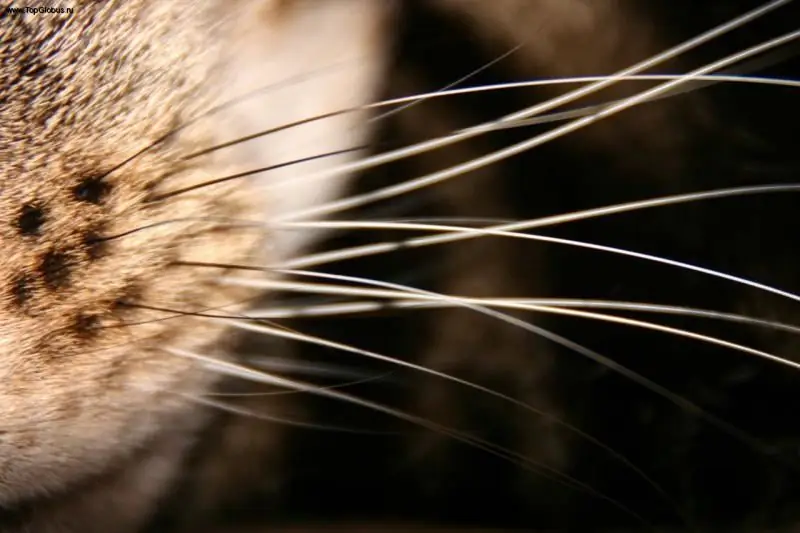
Table of contents:
- Author Bailey Albertson albertson@usefultipsdiy.com.
- Public 2023-12-17 12:53.
- Last modified 2025-01-23 12:41.
Why you can't kiss cats: reasons for the ban

Doctors, veterinarians, and animal husbandry specialists are unanimous in the opinion that cats should not be kissed. But what is the reason for this ban? Basically, the argument is made that through a kiss with a pet (and even more so with a stray one) you can get an unpleasant disease. But even if the animal is 100% clean of some microbes, fungi and worms, you shouldn't touch it with your lips anyway: cats are unpleasant with such a human act of manifesting love and they can easily “go on the attack” trying to protect themselves.
What cats think when a person kisses them
How do cats kiss each other? Obviously, it is completely different from us. And the meaning of their "cat's caresses" animals put completely different. If the cat wants to express its approval, then he can do one of the following:
- Blinks with two eyes (this is a sign of feline consent).
- It will rub with its muzzle and the base of its tail (this is how a cat leaves pheromones on an object that it considers its own).
- Will begin to lick, bite slightly, hammer with paws, periodically releasing claws (these are also all ways to leave their "marks").

Well-bred cats will tolerate kisses from their masters, but ambitious animals can bite or scratch
Human kisses are not affectionate to cats. Just imagine how we look from the position of an animal: a large head rapidly reaching for the cat, for some reason pressing its lips in the muzzle and making a hissing and smacking sound. A beast that has lived for a long time surrounded by people will eventually understand that such an action does not threaten him (although it does cause discomfort). Most likely, a pet will tolerate such a manifestation of love, and even use especially cunning cats for their own purposes (if they understand that afterwards they will receive the favor of the owner or a tasty treat). But out of ignorance or because of its fearful and distrustful disposition, a cat can see a threat in human kisses, which means it is able to begin to defend itself.

During a fight, animals not only hiss and gutturally scream, but also smack their lips, which is very similar to the sound made by people when kissing - that's why our "smack" for cats is tantamount to an offensive curse
Cats even try not to overdo it with affection among themselves. Excessive attention strains the animals. For a couple of seconds, they can still endure the harassment of a person, but they will try to run away from an excessive amount of hugs and kisses - they will start to hide, shy away from outstretched hands and even scratch and bite, showing that they do not want to be touched.

A light touch of a cat's nose can be called a kind of kiss, since the animal does this only in relation to “its own”, but the meaning of this gesture is to check what a person smells like - whether he has eaten something tasty and whether he needs it mark with your pheramons
Video: cats don't like human kisses
Why you shouldn't kiss cats
There are no absolutely clean cats - even those that live only at home and do not poke their noses out into the street. The fact is that they walk with their paws, sit and lie on the floor, where there can be dirt brought in by a person on shoes and clothes. Then the pets lick themselves with tongues (including under the tail), which means that their oral cavity and muzzles are a potential source of infections. In addition, cats can easily feast on flies that have flown into the house, look into the trash can or drink water from the toilet - the owners simply may not even guess about such tricks of their pet.

Having learned what cats do when they are left unattended, many owners will immediately give up the habit of kissing their faces.
Table: what kind of infection you can get through kissing cats
| What can you get when kissing cats | Short description | How a domestic cat could become a carrier of infection |
| Mycosis | Diseases caused by parasitic fungi (ringworm, sporotrichosis, candidiasis, malassezia, etc.). Microorganisms can infect the skin, hair, or enter internal organs (including the brain). |
|
| Bacterial infection | The most common is staphylococcus infection (after all, this bacterium is found on the skin and hair of 90% of animals). It can provoke many diseases, from mild skin infections (impetigo, phlegmon, staphylococcal burn-like syndrome) to dangerous lesions of internal organs (prostatitis, pneumonia, meningitis, osteomyelitis, sepsis, etc.). |
|
| Helminthiasis | Infection with worms. Microscopic eggs can be found in any part of the cat's body, including the fur of the muzzle. Most often, cat lovers become infected when kissing their pets with pinworms, ascaris. |
|

A cat can be completely healthy, but it carries more than 30 pathogens of various infections, many of which are "stored" on the animal's fur
Hugs and kisses with cats can be equated with playing Russian roulette - no one can guarantee that, upon contact with an animal, a person will not catch some kind of infection. In addition, kissing cats is not worth it for the reason that pets do not like such tenderness - they show their trust and affection in completely different ways.
Recommended:
Why Cats And Cats Love Boxes: How It Manifests Itself, What Are The Reasons, Harm And Benefits Of Such A Habit, Photos, Videos

Why cats and cats love boxes, how it manifests itself, what are the reasons for this behavior. The harm and benefits of such entertainment. What else attracts cats. Reviews
Whiskers In Cats And Cats: What Are They Called Correctly And Why They Are Needed, What Will Happen If You Cut Them And Why They Fall Out Or Become Brittle

Features of the structure of the mustache in cats. What are they called and where they are located. What functions do they perform. What problems can a cat with a mustache have? Reviews
Why You Can't Why You Can't Wash Floors On Friday: Signs And Facts

Why you can't wash floors on Friday: signs and superstitions. The opinion of the mystics and Orthodoxy
Why You Can't Step On Graves In A Cemetery And What Will Happen If You Break The Ban

Why you can't step on graves in a cemetery: superstition, church opinion, and rational reasons
Why You Can't Eat Buckwheat With Milk: Analysis Of The Reasons For The Ban

Useful substances in buckwheat and milk. How they are combined, why you should not eat milk buckwheat, as well as contraindications to the use of this combination
